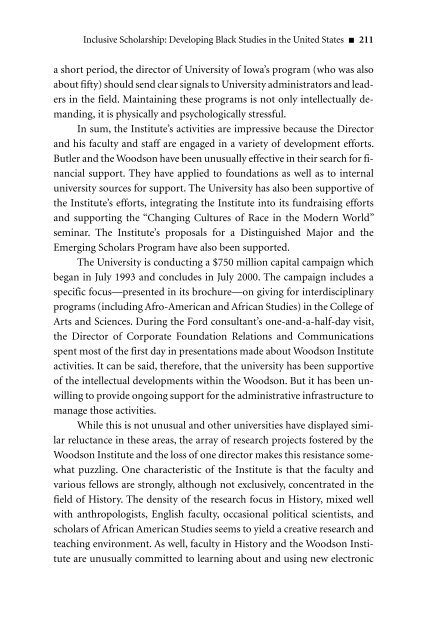Inclusive Scholarship: Developing Black Studies - Ford Foundation
Inclusive Scholarship: Developing Black Studies - Ford Foundation
Inclusive Scholarship: Developing Black Studies - Ford Foundation
Create successful ePaper yourself
Turn your PDF publications into a flip-book with our unique Google optimized e-Paper software.
<strong>Inclusive</strong> <strong>Scholarship</strong>: <strong>Developing</strong> <strong>Black</strong> <strong>Studies</strong> in the United States 211<br />
a short period, the director of University of Iowa’s program (who was also<br />
about fifty) should send clear signals to University administrators and leaders<br />
in the field. Maintaining these programs is not only intellectually demanding,<br />
it is physically and psychologically stressful.<br />
In sum, the Institute’s activities are impressive because the Director<br />
and his faculty and staff are engaged in a variety of development efforts.<br />
Butler and the Woodson have been unusually effective in their search for financial<br />
support. They have applied to foundations as well as to internal<br />
university sources for support. The University has also been supportive of<br />
the Institute’s efforts, integrating the Institute into its fundraising efforts<br />
and supporting the “Changing Cultures of Race in the Modern World”<br />
seminar. The Institute’s proposals for a Distinguished Major and the<br />
Emerging Scholars Program have also been supported.<br />
The University is conducting a $750 million capital campaign which<br />
began in July 1993 and concludes in July 2000. The campaign includes a<br />
specific focus—presented in its brochure—on giving for interdisciplinary<br />
programs (including Afro-American and African <strong>Studies</strong>) in the College of<br />
Arts and Sciences. During the <strong>Ford</strong> consultant’s one-and-a-half-day visit,<br />
the Director of Corporate <strong>Foundation</strong> Relations and Communications<br />
spent most of the first day in presentations made about Woodson Institute<br />
activities. It can be said, therefore, that the university has been supportive<br />
of the intellectual developments within the Woodson. But it has been unwilling<br />
to provide ongoing support for the administrative infrastructure to<br />
manage those activities.<br />
While this is not unusual and other universities have displayed similar<br />
reluctance in these areas, the array of research projects fostered by the<br />
Woodson Institute and the loss of one director makes this resistance somewhat<br />
puzzling. One characteristic of the Institute is that the faculty and<br />
various fellows are strongly, although not exclusively, concentrated in the<br />
field of History. The density of the research focus in History, mixed well<br />
with anthropologists, English faculty, occasional political scientists, and<br />
scholars of African American <strong>Studies</strong> seems to yield a creative research and<br />
teaching environment. As well, faculty in History and the Woodson Institute<br />
are unusually committed to learning about and using new electronic

















